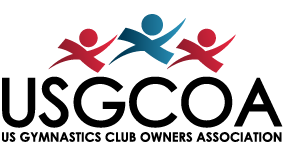Thinking of Adding an Afterschool Program?
There are several things to consider before committing to an Afterschool Care Program. First, check with your state’s Childcare Licensing requirements. While it may be possible to obtain an exemption from licensing by running a strictly skills-based sports training program, there are strict criteria that must be met in order to qualify. Not only will you need a waiver from your regulating body, be prepared for changes to laws and state personnel that could affect your exemption status. Assuming you fall under Childcare Licensing, below are a few things you should be prepared for in order to obtain a license:
- State-determined capacity based on your square footage and restroom facilities;
- Director qualifications that 1) may require a specific credential and 2) likely exceed your current staff’s education and experience (weighted toward early child development);
- Specific facility waivers needed for gymnastics equipment like trampolines, bars, etc;
- Outdoor play area requirements (often fencing is mandatory);
- Prepared lesson or activity plans, documented policies and procedural manuals, and written training materials;
- Written emergency action plans to include weather emergencies, shelter in place alarms, and active shooter protocols with a system for documenting staff training for each.
These will vary from state to state, so check resources in your area to know what you will need.
Once you are licensed, you will be required to comply with state regulations regarding:
- Employees: Background check and fingerprint all employees (often USAG membership takes care of the background check, but not the fingerprinting). There will be mandatory Pre-Service training, required Orientation Training and continuing education training along the way for employees and directors. You will need to maintain extensive employee files documenting all of these things and more;
- Students: Comprehensive records are required for each student detailing enrollment information, parent contact details, medical history, and more. You will have to limit your Afterschool Students’ contact with other staff, students, parents and even contractors unless you are able to background check everyone they come into contact with at your facility;
- Facility: Documented daily cleaning/sanitation/safety checks are often needed as well as any annual inspections required like Health Department, Fire Department, etc. Sanitation protocols (handwashing and wiping of surfaces, for example) can be very specific and will likely require documentation;
- Food Service: Depending on state regulations and the length of your program each day, you may be required to serve a snack. Some examples of considerations you may encounter: required food-handling training, allergen monitoring, parent release of liability for the nutritional value of what you serve or what the students buy from your vending machine, etc;
- Transportation: Specific transportation training for drivers is usually required, your vehicles can be inspected at any time for things like cleanliness, working fire extinguishers, first aid kits, seatbelt function, registration paperwork and the like;
- Accidents and Emergencies: You will likely be required to report to your governing body any student accident requiring medical attention OR resulting in medical attention. CPR/First Aid (usually child/infant) is generally required for all employees.
There is an extensive list of requirements to be met and those vary by state. This is just an overview of some of those that may impact your operating program the most. Even if you already practice some of these regularly, you may have to adapt to Licensing specifications for documenting or reporting them.
Some other considerations which are not directly associated with a childcare license could be:
- The liability of transporting children, maintaining fleet vehicles, additional vehicle insurance costs, driving record checks, etc.;
- Integrating Afterschool students into rotation schedules: Likely your Afterschool Program will utilize a higher student to staff ration than classes or team…this can require a larger “work space” for a bigger group of children with additional stations. Because these groups can be larger, organization is critical to avoid your gym appearing chaotic and over-crowded (especially in this era of social distancing);
- Utilizing “non-gymnastics” spaces: Depending on what you offer or are required to provide, you may need to evaluate spaces for food service, homework (screen time is generally limited), outdoor play and more;
- Facilitating end of day pick up: Depending on the size of your program…are you prepared for 50 parents to arrive, park, enter the building, sign their children out and find their way out of the parking lot smoothly during your busiest Recreational hours?
- Additional insurance requirements: Some insurance companies require a separate policy rider for Licensed Childcare-check your coverage;
- Administrative requirements: These could include programming, scheduling, staff requirements and training, and coordinating afterschool pick up by communicating with parents, schools and drivers;
- Location, location, location: proximity to schools, demographic of nearby areas (ie-working parents will need your services the most), saturation of similar services in the market, and area traffic at pick up times can all determine what will work best for you in your area.
A successful Afterschool Program can be a great addition to your gym. Not only can it provide a consistent revenue stream, it will also function as a feeder program to classes and teams while providing a great service to your community. While it can require a lot of effort, depending on the size of the program, the rewards are many. And though some of the licensing requirements can seem tedious, it is hard to imagine a program that would not be safer, more organized and better prepared after meeting the additional licensing requirements. The key is to do the research beforehand to know your state’s licensing requirements so that you can fall solidly into either the EXEMPT or the COMPLIANT category. From there, you can build a safe and fun program that compliments your gym and community.
Contributed by Jeff Beal, Region III, Owner of Olympia Hills Gymnastics and Laura Shoffner, Afterschool Director


